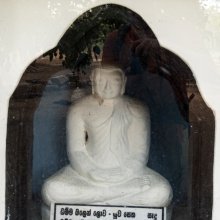Dhammadassi, Dhammadassī: 1 definition
Introduction:
Dhammadassi means something in Buddhism, Pali. If you want to know the exact meaning, history, etymology or English translation of this term then check out the descriptions on this page. Add your comment or reference to a book if you want to contribute to this summary article.
Images (photo gallery)
In Buddhism
Theravada (major branch of Buddhism)
Source: Pali Kanon: Pali Proper Names1. Dhammadassi - The fifteenth of the twenty four Buddhas. He was born in the Sarana pleasance in the city of Sarana, his father being a khattiya named Sarana, and his mother Sunanda. It is said that on the day of his birth all unjust laws disappeared from the law books, hence his name. For eight thousand years he lived in the household, in three palaces - Araja, Viraja and Sudassana. His chief wife was Vicitoli and his son Punnavaddhana. He left the world travelling in his palace, accompanied by all his retinue. For seven days he practised austerities; his wife gave him a meal of milk rice, and a yavapalaka, named Sirivaddha, gave grass for his seat; his bodhi tree was a bimbijala tree. His first sermon was preached at Isipatana. Later he preached to King Sanjaya of Tagara, and to Sakka, who was the Bodhisatta. The Buddhas half brothers, Paduma and Phussadeva, became his chief disciples, and Harita was chief of those who practised the dhutangas. The Buddhas personal attendant was Sunetta, his chief women disciples being Khema and Sabba-(Sacca)-dinna. Subhadda and Katisaha were the chief among men of his lay patrons, and Saliya and Valiya among women. The Buddhas body was eighty cubits high and he lived to be one hundred thousand years old, dying at the Kesarama in Salavati. Bu.xvi.1ff; BuA.182ff; J.i.38, 39, 40, 44.
2. Dhammadassi - A monk of Pagan, author of the Pali grammar, Vaccavacaka. Bode. op. cit., p.22.
Theravāda is a major branch of Buddhism having the the Pali canon (tipitaka) as their canonical literature, which includes the vinaya-pitaka (monastic rules), the sutta-pitaka (Buddhist sermons) and the abhidhamma-pitaka (philosophy and psychology).
See also (Relevant definitions)
Full-text (+8): Valiya, Araja, Saccanama, Kesarama, Tagara, Jagatidayaka, Sudassanarama, Viraja, Vicitoli, Shaliya, Vacavacaka, Katissaha, Sharana, Twenty Eight Buddhas, Salavatika, Paripunnaka, Punnavaddhana, Phussadeva, Sunanda, Sunetta.
Relevant text
Search found 3 books and stories containing Dhammadassi, Dhammadassī; (plurals include: Dhammadassis, Dhammadassīs). You can also click to the full overview containing English textual excerpts. Below are direct links for the most relevant articles:
The Great Chronicle of Buddhas (by Ven. Mingun Sayadaw)
Buddha Chronicle 15: Dhammadassī Buddhavaṃsa < [Chapter 9 - The chronicle of twenty-four Buddhas]
Supplement (a): Brief Statement of Future Buddha Gotama’s Live < [Chapter 9 - The chronicle of twenty-four Buddhas]
Supplement (d): The Eight Differences (vematta) < [Chapter 9 - The chronicle of twenty-four Buddhas]
Apadana commentary (Atthakatha) (by U Lu Pe Win)
Various other 22 Buddhas < [Part 1 - Remote preface (dūre-nidāna)]
Gaining Of Perfections By Bodhisat < [Part 1 - Remote preface (dūre-nidāna)]
Mahavamsa (by Wilhelm Geiger)
